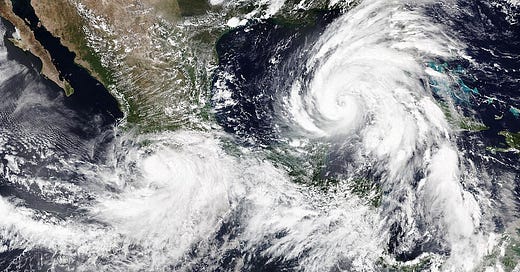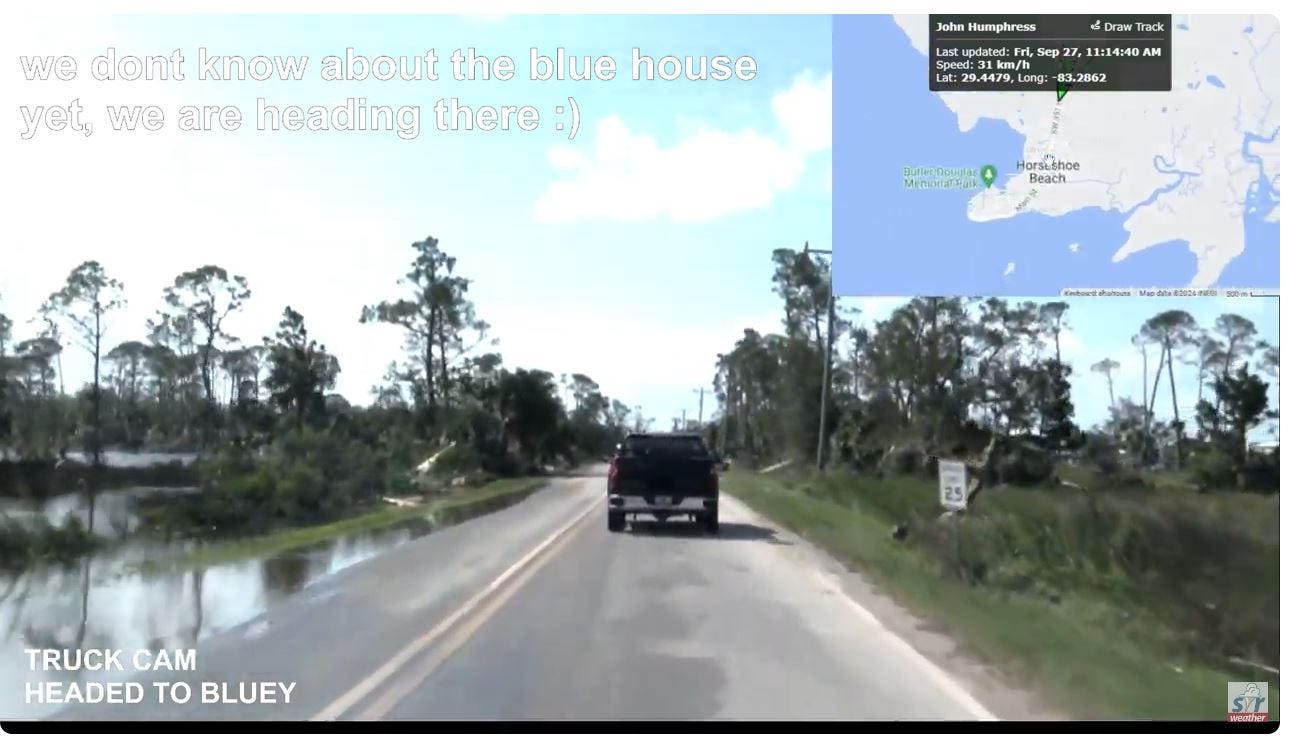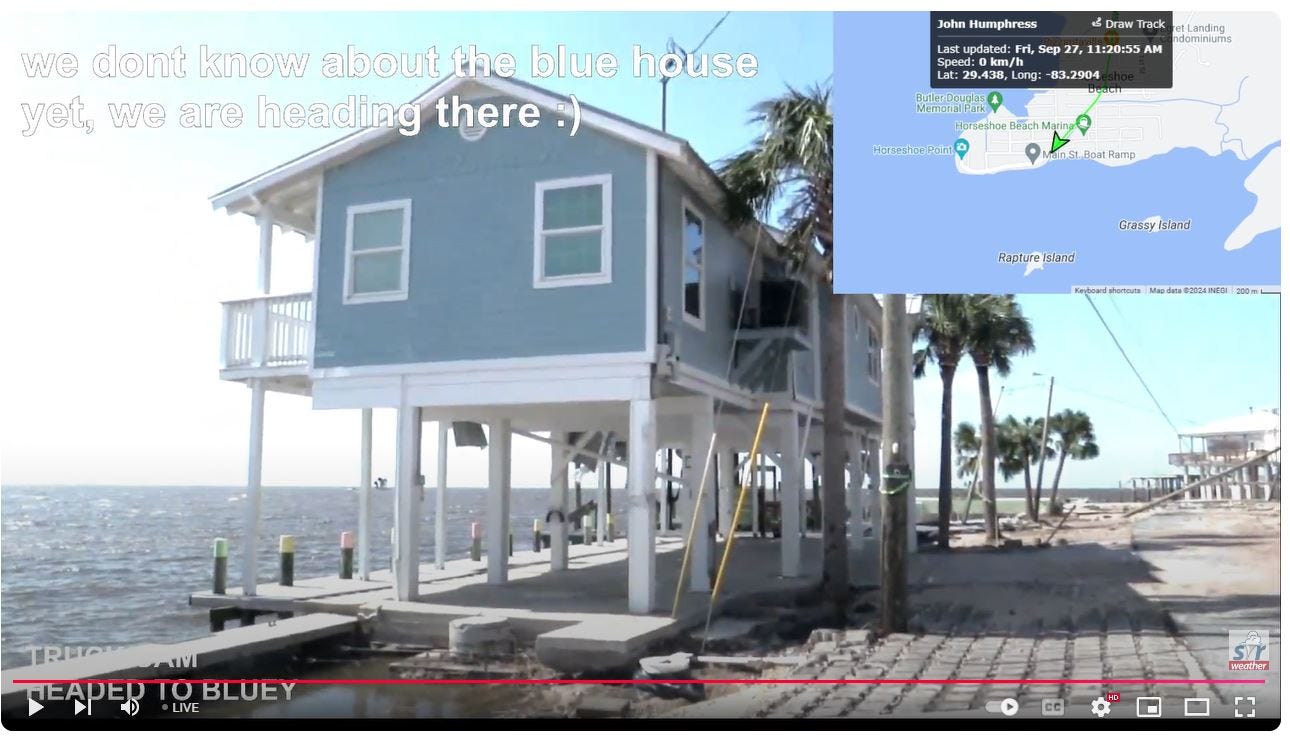Little Blue House in the Hurricane
On election eve, an offering on metaphor and symbol.
Not knowing when the dawn will come
I open every door
― Emily Dickinson
The night of Hurricane Helene, I was rooting for a little blue house not to float away. I didn’t know the owner; I didn’t even know where, exactly, the house was. (It turned out to be in Horseshoe Beach, FL.) A team of “extreme weather” chasers had made it the focal point of one of the storm cams they’d set up in advance, and I’d stumbled across their live stream. Periodically that night, I checked the feed and, with increasing fascination, followed the ticker-tape of comments alongside it.
In the morning, we’d see devastation as far west as Asheville, NC. The town of Chimney Rock was gone. Hundreds of people had died. Highways into and out of mountain towns had crumbled into roiling brown waters like stale crusts of toast.
So why, as nightmares became real, did so many random strangers fixate on an empty beach house? In our defense, we were helpless to do much else; the suspense of the live feed hooked us in; and just about anything can come to stand for something more than itself.
With each violent wave, the house would disappear. Then it would emerge intact, the Dr. Seuss palm tree out front still rooted and frantically waving. The virtual peanut gallery cheered each time.
Of course, because the house was blue instead of, say, yellow, the chat spawned political teams with some haters rooting for its destruction. For me, judging by the otherwise inexplicable tears in my eyes, Bluey represented something primitive and essential: all our frail shelters in all the storms; human civilization standing firm against whatever tries to tear it loose from its foundations. Apparently, I’ve felt as if we’re hanging on by our fingernails for so long that I can weep over a mobile home on stilts.
Casting our heart-lines out to symbols—hooking our feelings into a thing as if it were a stand-in for something dearer or more terrible—is as natural as a child’s first speech. Almost as soon as we start talking, we start pretending. Soon we’re cradling baby dolls, defending cardboard castles, and battling Lego dragons with toothpick swords. The creative transmogrifications never end; the stakes just get higher and higher. Who wants to be the dragon today? Who wants to be a little blue house trying not to float away?
We world-weary grownups cheered for that little blue box with a measure of jaunty self-irony, but we did it just the same. Someone typed, probably only half kidding, "If we all believe hard enough we can save it."
My computer screen is no Schrodinger’s box; my gaze, no matter how sincere, fails to affect outcomes. Still, between bouts of working on an English lesson and huddling in a corner during a tornado warning, I kept vigil with the Bluey fans until Cam 11 finally lost its moorings and floated out to sea. We heard glug-glug sounds as the cam bobbed and then sank like an arrow-shot sentinel.
That’s when things got weird.
With the video out and all of us in the dark, someone joined the chat calling himself “fortnite dad.” He claimed to be hunkered down in an apartment building across from Bluey, watching the house with his own eyes. I formed a mental picture of a grizzled old fellow nursing a 6-pack of Budweiser by the glow of a battery-powered lantern. Not that he’d described himself as such; my mind just likes to piece together images from scraps.
Fortnite dad typed everything with caps lock on, suggesting a raspy but defiant voice shouting over the howl of hurricane winds.
I was glad when someone voiced my worry: “Wait, you’re there? Are you OK?”
Fortnite dad gave vague assurances as to his safety. Then he typed with apparent relish, “BLUE HOUSE WENT KERPLOSH.”
Some cynical veteran of chat wars typed back, “Liar! Don’t listen to the troll.”
The troll/eyewitness insisted, “I’M WATCHING IT WASH AWAY.”
I turned off the computer and went to bed.
The next morning, I tuned back into the feed with my coffee. The sun was shining, and the storm chasers were out in their truck to pick up their cams and see what was what. Through their dash cam, we rode along. They stopped at a Hardees for breakfast; despite having little room in the truck, they stopped to give a couple of Hispanic line workers a lift and wished them well. They drove slowly past a downtown reduced to matchsticks and said, “God, it’s so tough seein’ all this.”
In the virtual peanut gallery, spectators were clamoring with childlike impatience for news of Bluey. If the house was still there, they wanted to book it on AirBnb. If it was gone, they wanted to start a fundraiser for a memorial rock.
Sometimes when writing about figurative language for high-school kids, I wonder how much it matters whether they know the difference between a simile and a symbol or, God help them, synecdoche and metonymy. Will that kid in the fourth row ever even read another poem? Those salt-of-the-earth storm chasers, for example, probably left Emily Dickinson behind without a backward glance.
But it matters, even so. If we manage to teach American teens nothing else about figurative language, I hope we at least can help them learn to mind their own emotional responses. If the heart screeches or exults all out of proportion to the thing at hand, it’s probably a stand-in for something else. That’s just how our minds and hearts work.
We not only live in a sea of symbols; we constantly become symbols to one another. We care so much about our lives here on earth’s fragile crust that we’re ready to kill or die for what things signify. The object may be symbolic, but the violence is real. That’s a terrible power to hand over blindly to crafters of narratives who tug on our heartstrings for their own ends. A lie can tear through a country like a hurricane.
Bluey made it through the storm. In the light of day, the lying troll disappeared.
Last night I rewatched the “Darnok” episode of Star Trek: The Next Generation, in which Picard struggles to communicate with an alien race who speak only in metaphors and allusions. No one has any clue what they’re talking about. To provide a ground for understanding, the captain of the alien ship has himself and Picard beamed down to a planet with a ravening beast so that they will have to work together to survive.
Even when Picard figures out the pattern of the alien language, he still has to find the referents: “Temba, his arms wide” and “Gilgamesh and Enkidu at Uruk” are equally meaningless if you don’t know the stories to which they allude. The episode struck me as a poignant reminder of the importance of cultural literacy, of giving future generations a heritage of shared stories.
If someone asks how I’m doing tomorrow, I may just wave my arms wildly and say, “little blue house in the hurricane.” Also, “I voted.”







Jody, good gawd. This is a brilliant piece of writing doing some REALLY heavy, understated lifting.
I mean: "Just about anything can come to stand for something more than itself."
Also, I have a maybe impossible question: How do we encourage self-curiosity about those out-of-proportion reactions? How do we encourage people to be more curious about their internal-emotional scope? (Asking for a friend / country.)
Hi Jody! Thank you for your column.
I feel like a blue dot in a very red hurricane.
I voted for Kamala Harris and will NEVER understand Donald's voters!
I hope you are doing Ok.